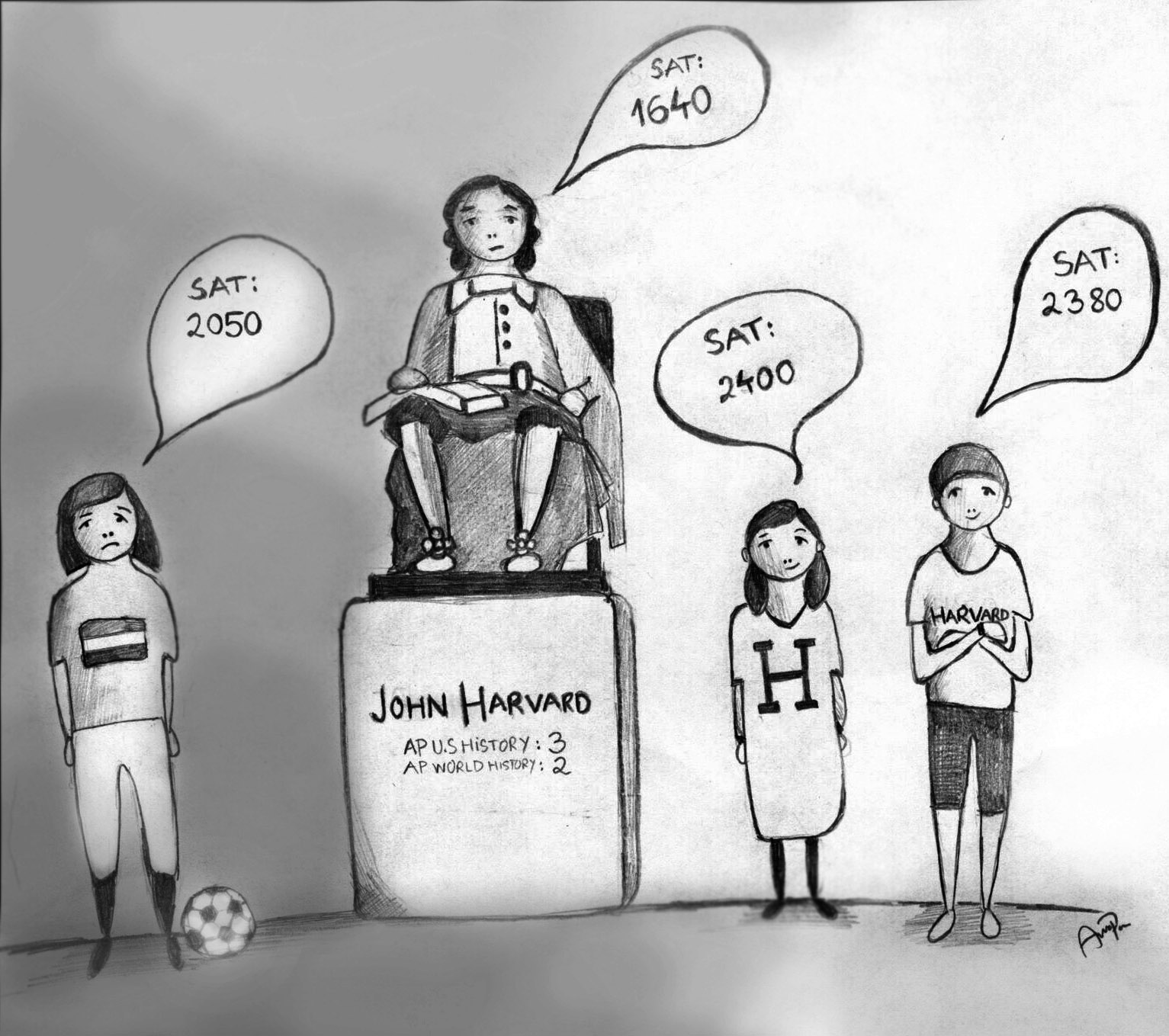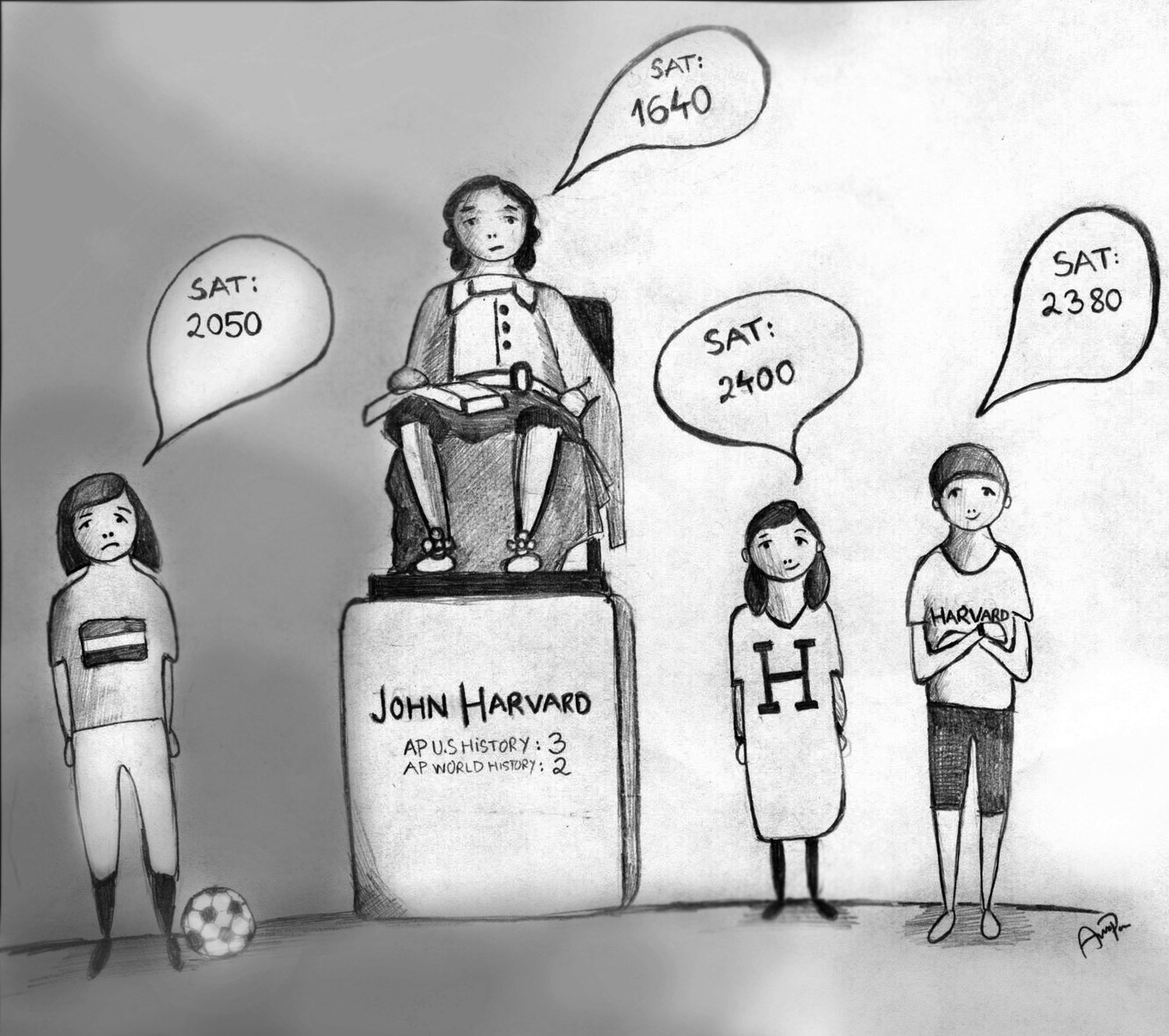
News
When Professors Speak Out, Some Students Stay Quiet. Can Harvard Keep Everyone Talking?

News
Allston Residents, Elected Officials Ask for More Benefits from Harvard’s 10-Year Plan

News
Nobel Laureate Claudia Goldin Warns of Federal Data Misuse at IOP Forum

News
Woman Rescued from Freezing Charles River, Transported to Hospital with Serious Injuries

News
Harvard Researchers Develop New Technology to Map Neural Connections
Making the Grade
Steven Pinker is Wrong

UPDATED: October 9, 2014, at 11:56 a.m.
I can vividly remember the slew of questions that everyone asks each other during Opening Days: “Where are you from? What’s your main extracurricular activity? What were your SATs and AP scores?” The last question stood out to me the most. Here I was, at Harvard, and it seemed as though within our first weeks together, we were trying establish the merit of our own place here and where we all ranked relative to one another.
According to Harvard professor Steven Pinker’s article, “The Trouble With Harvard,” the SAT should be the sole determinant of who belongs at Harvard and who does not. Specifically, Pinker states that standardized testing is the “magic measuring stick,” and that if used as the sole basis for admissions, will enable Harvard and other prestigious American universities to produce the best possible graduates and eliminate the growing zombie-like state of students and the anti-intellectualism that exists on campuses.

While I agree we should try to fix the problems Pinker highlights, I fundamentally disagree with Pinker’s argument that standardized-test based admissions is the way to do so. First, in no way does the SAT or any other standardized test measure curiosity, passion, or a desire to learn. Pinker laments that he “faces a lecture hall that is half-empty” and that students do not take enough advantage of the fact that Harvard is “an institution that is single-mindedly and expensively dedicated to the pursuit of knowledge.” Intelligence, or at least the kind that Pinker believes belongs at Harvard, is not the trait that inspires students to go to class or use these resources; the desire to learn is. The SAT and the AP do not measure that willingness or the willingness to ask hard questions of people like Pinker. They actually show the opposite skill: the ability to find an answer when there is definitively one to be found.
Similarly, the way that Pinker appears to dismiss athletics, music, and similar activities suggests that he might not recently have had many conversations with students about the experiences that shape their lives. Having played sports throughout high school, I learned more from them about how to problem solve, how to work in a team, how to persevere, and how to pursue a goal than I did from any test. I imagine that many of my peers would say their experience playing an instrument, singing in a chorus, or being apart of student government taught them similar lessons. The skills I mentioned above are what enable people learn from a bad grade and to teach people to communicate with people who have different opinions, two vital parts of an intellectual community. Maybe the students Professor Pinker dreams are behind those 2400s automatically possess these skills. I think that is a dangerous assumption, though.
Despite the criticisms I have offered so far, the difference in Professor Pinker’s and my viewpoints ultimately rests in how we define excellence and intelligence. If I understand his point of view, he views them both as concrete, objectively obtainable ideals that are based solely upon quantifiable and standardized academic results. However, I believe there are different ways to define them.
Howard Gardner, also a Harvard professor, argues in his theory of Multiple Intelligences that students “possess different kinds of minds and therefore, learn, remember, perform, and understand in different ways.” Gardner suggests that intelligence and excellence can take all different forms, and I applaud the Harvard admissions committee for recognizing this reality. A student who has attended schools with limited resources but has still found a way to thrive intellectually (even if the student does not get a 2400) has exhibited the ability to make the best of the opportunities afforded to him or her, a skill that is vital to succeeding at Harvard and in life. This student, to me, is excellent. A student who has the ability to sit down for 3.5 hours and think through a set of questions to find the correct answer each time is also excellent, just like the athlete who can run fast, jump high, and put the team’s needs above his or her own is. Above all, the student who can educate his or her peers with a different viewpoint articulated in a kind and clear fashion, challenge his professors with pointed and thoughtful questions, and think carefully and curiously about the world around him is excellent and intelligent. If Professor Pinker can find a test that measures all the forms of excellence and intelligence I have mentioned, then I am fully supportive of the admissions process being only testing-based.
In the meantime, I hope that we can all care a little less about our scores on tests of any kind. They in no way define our intelligence, our worth, or who we are. Ironically, I believe if we do the opposite of what Pinker prescribes and care less about statistics alone and stop defining ourselves in terms of them, we have a better chance of achieving the type of thoughtful, intellectual community that Pinker would like to see.
James Piltch ‘17 lives in Leverett House. His column appears on alternate Thursdays.
Want to keep up with breaking news? Subscribe to our email newsletter.
